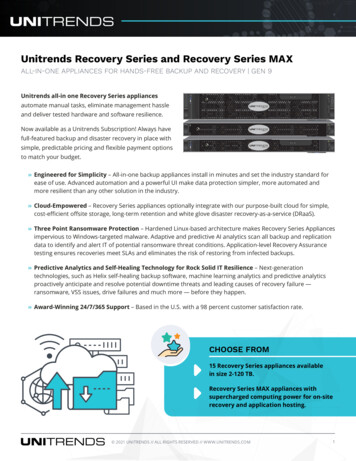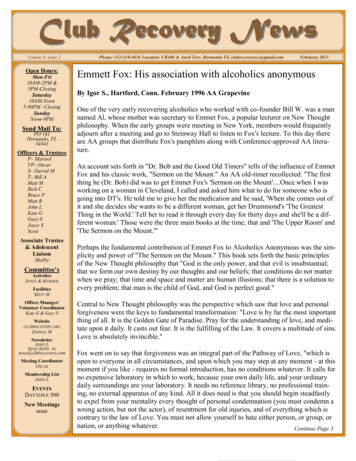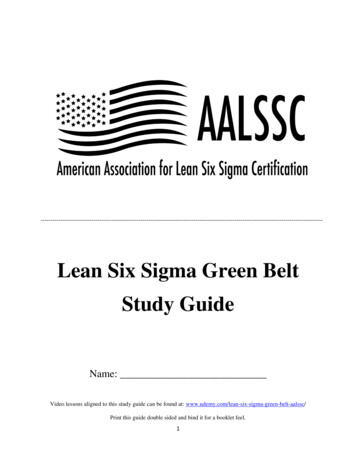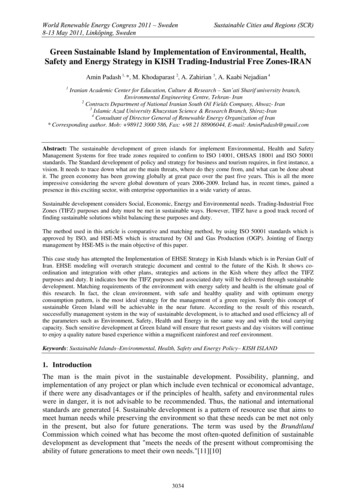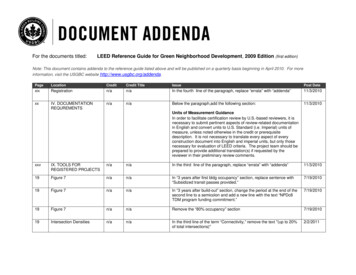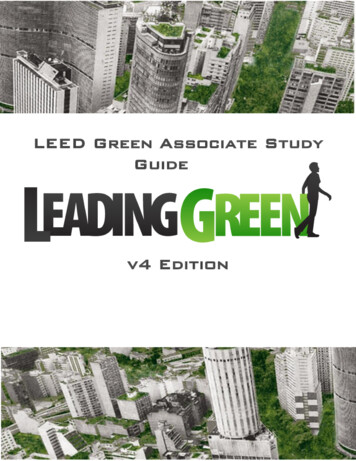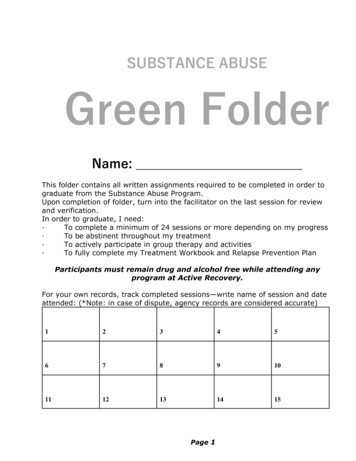
Transcription
Green FolderName:This folder contains all written assignments required to be completed in order tograduate from the Substance Abuse Program.Upon completion of folder, turn into the facilitator on the last session for reviewand verification.In order to graduate, I need:·To complete a minimum of 24 sessions or more depending on my progress·To be abstinent throughout my treatment·To actively participate in group therapy and activities·To fully complete my Treatment Workbook and Relapse Prevention PlanParticipants must remain drug and alcohol free while attending anyprogram at Active Recovery.For your own records, track completed sessions—write name of session and dateattended: (*Note: in case of dispute, agency records are considered accurate)123456789101112131415Page 1
161718192122232420Serenity PrayerGod, grant me the Serenity to ACCEPT the things Icannot change, COURAGE to change the things Ican, and the WISDOM to know the difference.This is aboutACCEPTANCE.Instead of getting angry, being overly critical ordenying the situation completely, recognize that your present situation came froma long chain of events that began far in the past, based on many of YOUR OWNdecisions.RADICAL ACCEPTANCE doesn’t mean you agree with bad behavior in others, orcondone it. It means you stop trying to change the situation by blaming orgetting angry. Here are some coping skills:“The present is the only moment I have control over.”“This is just the way it has to be right now.”“All of these events have led up to what’s going on right now.”“I can’t change what’s already happened.”“It’s no use fighting the past.”“This moment is the result of a thousand other decisions that have led up to it.”Page 2
What is Addiction?Addiction is defined as a chronic, relapsing brain disease that is characterized bycompulsive drug seeking and use, despite harmful consequences.It is considered a brain disease because drugs change the brain; they change itsstructure and how it works. These brain changes can be long lasting and can lead tomany harmful, often self-destructive, behaviors.Some addictions are PHYSICAL, like opiates, benzos and alcohol. You will need towean off or go to medical detox.Others are PSYCHOLOGICAL, such as cocaine, meth, etc. Both are equallysubstantial in that they can take you down QUICKLY.Pain medications, even when prescribed by a doctor, can lead to severeaddictions! Be sure to let your doctor know if you have ever had addiction disorder.CROSS-ADDICTION is substituting one drug for another; some people go fromillegal to legal, like going from pills to alcohol.or harder drugs to softer, like methto marijuana.then IT takes you down that path of destruction. The addiction isSTILL THERE; you’ve just replaced it with another substance. Can you give anexample of this in your life?Page 3
MY ADDICTION SURVEY?Instructions: Circle the number with 1 being the least like me and 5 beingthe most like me in the last year.1. You find you are using more of the drugs/alcohol than you first intended to, and over alonger period of time.Least like me12345 Most like me2. You have really tried to slow down or control your use but just can’t:Least like me12345 Most like me3. You find that most of your time is spent finding, using and recovering from the drugs oralcohol:Least like me12345 Most like me4. You frequently have a strong urge/craving to use drugs/alcohol.Least like me12345 Most like me5. You are not able to fulfill your obligations at work, school or home because of your use:Least like me12345 Most like me6. You continue to use drugs/alcohol despite having big problems in your family life, sociallife, work or school:Least like me12345 Most like me7. What used to be so important to you (fun hobbies, sports, work, etc.) are just not ofinterest anymore because of your use:Least like me12345 Most like me8. You find yourself in really hazardous and dangerous situations because of your use.Least like me12345 Most like me9. You have developed a tolerance for it; it takes much more to get the high that you want.Least like me12345 Most like me10. You continue to use DESPITE NEGATIVE CONSEQUENCES (bad things happen and yetyou still use)Least like me12345 Most like mePage 4
FORMING NEW HABITSNEURO-SCULPTING, is a process for forming new habits as it changes the way yourbrain is wired to form new habits. f you do anything long enough or consistentlyenough, it creates new neural-pathways in your brain (such as your habit of drinking2 beers after work, or smoking thatblunt first thing every morning!) BUT.if youstart a new habit and do IT consistently, you are forming BRAND NEW neuro-pathwaysand will start seeing progress already in 10-12 days!YOU CAN MAKE A HEALTHY NEW HABIT OR BREAK AN UNHEALTHY ONE in just 21days, if you do it consistently.Keep doing this until it becomes a natural part of your day. Remember, you needto consistently do it for at least 21 days. You are creating NEW NEUROPATHWAYS and developing a healthy new habit.The LAW OF ATTRACTION is that whatever you are focusing your mind on will growand become real to you.Focusing on POSITIVE thoughts andenergy will create GREAT results !!Page 5
GRATITUDE JOURNALThinking POSITIVE thoughts, showing GRATITUDE and being MINDFUL ofwhere your mind is taking you is ACTIVE RECOVERY!!Each day, write down 3 things that happened TODAY that you are grateful for.Start TODAY:Day 2:Day3:Day 4:Day 5:Day 6:Page 6
Day 7:Day 8:Day 9:Day 10:Day 11:Day 12:Day 13:Day 14:Page 7
Day 15:Day 16:Day 17:Day 18:Day 19:Day 20:Day 21:Page 8
DENIAL is the idea that I can lie to myself DENIAL is telling yourself(and others) that you’re not an addict. Give examples of each DEFENSEMECHANISM listed below:MINIMIZING your use (making it seem much smaller than it really is):RATIONALIZING your use (coming up with reasons why you use):LYING about your use (even to yourself!):BLAMING others for your use:JUDGING/Comparing other people’s issues to make yourself feel betteryours:ACCUSING others to take the focus off your addiction:HOSTILITY when someone confronts you on your use:Page 9about
WHO AM I REALLY?1.I am (not your name!)2.All of my life I have wanted3.I feel most liked when4.I get angry when5.My Biggest Fear is6.Other people think I am7.I feel strongest when8.I feel good when I remember9.When I am alone I feel10. I was the type of Child who11. Most people don’t know that I12. I feel least like me when13. Never, ever refer to me as14. I’ve secretly always wanted to15. The world is a place16. When I die, I17. I wish people viewed me as18. I feel shame when I think about19. The worst part of me is20. The best part of me isPage 10
MY LIFE STORYComplete the following. If you need more space, you may write in a journal as well.Describe your childhood memories of your family; who all was in the home? Whatwere your parents like? Sisters, brothers?Who were you closest to?Describe your worst memory of your childhood:Describe your best memory from your childhood:How old were you when you started using/drinking?Describe how your behaviors changed when you started using drugs or alcohol:Page 11
Describe how others started to behave towards you:How did your life change once you started using even more heavily?How many legal issues have you had to deal with because of your use?What can you ACCEPT has happened, that you cannot change?Page 12
What can you CHANGE about your situation?Are you ready to make a change in your life? HOW?Page 13
DEALING WITH RESENTMENTSBelow is a sample/template of how you can start dealing with old hurts andresentments. What are you “re-sensing” over and over again that still upsets youtoday, even though it’s long passed? Who are you still feeling resentments for?Why?Page 14
RESENTMENT LETTERWrite a letter to that person that you do NOT let them see. Use thetemplate: (You may write more than one!)followingDear .I RESENT you forI REGRET that this happened becauseI RESPECT that this had to happen in order to help me learn and realize somethingabout myself, namelyEven though you may not deserve my forgiveness, I must do this in order to moveforward with my own life and not be further burdened by this horrible feeling ofresentment toward you.I forgive you and ask that this forgiveness will SET ME FREE because I DESERVE tolive a happy life free from resentments.Sincerely,Page 15
Finally, write a GOODBYE letter to your drug of choice/alcohol. Youare breaking up with an old friend and ally because of all of the trouble ithas brought you. Use the back of sheets provided or additional pages ifneeded.Dear ,Sincerely,Page 16
THE SECRET OF CHANGE is that you FOCUS your energy and thoughts onto what youwant to accomplish, and move your thoughts AWAY from thosethings that you want to avoid in your life.For example, instead of telling yourself, “I need to stop going to the liquor store afterwork on Fridays” instead you tell yourself “I am able to find a great new book/movie/ activity/ etc. to do on Friday’s.”You are deliberately focusing on what you WANT to accomplish,no longer even mentioning what you are trying to get away from.Get it? Give 3 examples of how you can start focusing on what you DO want toaccomplish in your life:#1:#2:#3:I AM living a life of sobriety and clean living!I AM setting healthy boundaries with certain people in my life.I AM able to control my emotions and respond, rather than REACT in anger.Page 17
I AM a success story in the making!!Using I AM statements also convey POSITIVE energy to recreate what you want.Don’t use “I AM GOING TO ” but rather use Present-Tense, AS IF it were alreadyhappening. Now let’s put this into practice.Instead of saying “I can’t drink/use anymore”I AMInstead of saying “No one will ever trust/love me again, it’s hopeless”.I AMInstead of saying “I’ll be bored; I won’t be able to hang out with my friends”I AMInstead of saying “My life is ruined; I really messed it all up.”I AMList some more I AM statements below that create what you want in life:I AM:I AM:I AM:Page 18
Even if you don’t feel this way, keepsaying it until it becomes your “NEWNORMAL!”SPEAK it intoexistence;There is power inyourPOSITIVETHOUGHTS.Page 19
ASSERTIVE COMMUNICATION SKILLSUse “I FEEL” statements to convey YOUR emotions when others do things that mayupset you. OWN your feelings. Avoid ANGER words, as anger only hides otheremotions listed below.Feeling edRegretfulInferior“I FEEL (your emotions)WHEN YOU (did something)AND I’D RATHER YOU DID INSTEAD.”Be sure to let them what you would RATHER they did instead.AVOID using the words “YOU ALWAYS ” or “YOU NEVER ”, as these willonly provoke a defensive reaction.REFLECTIVE LISTENING is when the response is “What I hear you saying is(rephrasing what you think they said). Is this correct?”Practice and “I FEEL” statement here:Page 20
DEALING WITH NEGATIVE SELF-TALKThink about what you’re thinking about! If you allow negativity to invade yourthoughts constantly, you will remain unhappy and resentful. SOME EXAMPLES: “I’llnever get a job, might as well stop trying.” or “That person is deliberately trying tomake me mad.” “Everyone wants to see me fail.”What are some things that you might tend to think to yourself when something badhappens to you?What can you try to say to yourself instead?You can change your thinking by recognizing your THINKING ERRORS:1. All-or-Nothing thinking. It’s “go big or go home”, nothing is just average, it’seither BLACK or it’s WHITE, no shades of gray. My example of this:Instead I can:2. Catastrophizing: Always thinking the worse-case scenario to happen living in fearof the unknown:Page 21
Instead I can:3. Negative Mental Focus: Only seeing the bad, focusing on the negative and filteringout anything good. My example of this:Instead I can:4. Labeling/Judging: Believing that if one group/race/religion/type of person is bad,then ALL of them are bad. My example of this:Instead I can:5. “Should” statements: Holding shame-based thoughts on how you or othersSHOULD behave. My example of this:Instead I can:Page 22
6. Denial/minimizing: Not being honest with yourself with the extent of the damageyou may have caused in your use, or making it appear smaller than it really is. Myexample of this:Instead I can:7. Mind-reading/fortune-telling: Believing that you already KNOW what others arethinking and feeling without any evidence. My example of this:Instead I can:8. Taking things too personally: Easily offended by trivial matters. My example: Myexample of this:Instead I can:Page 23
ANGER MANAGEMENT/RULES FORFAIR FIGHTINGYes, there are basic rules that you can follow.THINK before you REACT. Take a deep breath or five, and think it through.AVOID saying hurtful things that were told to you in private; this is an act of betrayalthat will not be taken lightly.ASK for a “TIME-OUT” for 30 minutes to cool off if things get too heated. Duringthis time-out, DO NOT call your family or friends to complain and gather support, itwill come back to bite you later! DO NOT leave without coming back within 30minutes. DO NOT use drugs or drink during those 30 minutes. DO NOT call an oldgirlfriend or boyfriend and make it worse than it already is. DO NOT allownegative thoughts to enrage you even more. Monitor your NEGATIVE SELF-TALKcarefully.don’t make it worse!DO take a brisk walk, exercise or journal your thoughts; listen to mellow music,pray, meditate, draw, create art. Whatever you do to calm yourself down is key.BREATHE. Give 3 examples of what YOU can do to calm down:#1:#2:#3:Page 24
THE TEN CORE CONCEPTS OF ACTIVE RECOVERYGRATITUDE: I am able to express appreciation for all of my experiences,both the positive and the negative. Give examples of how you can appreciateeven negative experiences. Why?EMPATHY: I can imagine how others my thing and feel in any givensituation. Explain how seeing from other people’s points of view can change howyou feel about the situation?SPIRITUALITY: Partnering with something greater than myself as THESOURCE of strength, comfort and hope. What does this mean to you?HONESTY: I am truthful to myself and others; I realize that half-truths andomissions misrepresent the TRUTH. Give examples of how you were not honestwith YOURSELF and others:INITIATIVE: I am able to take it upon MYSELF to do those things that needto be done, whether I want to do it or not. Give an example of how youraddiction stopped you from stepping up and doing what needed to be done:COMMITMENT: If I say I’m going to do something, I follow it through tocompletion. Give an example of how you may have made promises to someonethat you could not keep, especially to children:Page 25
INTEGRITY: I am able to do the next right thing, even if no one is watchingand especially if it’s not the ‘popular vote’. Give examples of how you may have“followed the crowd” in doing something that you knew wasn’t right:RESPECT: I have a feeling of admiration and positive esteem for another’sValues, Conduct and Principles. Name someone that you admire for what theythink is important, how they conduct their behavior, and rules that they live by.Now look at your Self-Respect.What do you think is important to you?What can you do to handle your behaviors in a more self-respecting way?What are some rules that YOU live by that exhibit self-respect?COMMUNICATION: I am able to relay my feelings and needs to othersassertively, and I truly listen to what they are saying to me. Give examples ofan I FEEL statement that you could use with someone now:How can you show that you are truly listening to someone when they are talking toyou?RESPONSIBILITY: I am aware of and follow through with those obligationsto do what I NEED to be doing, not necessarily what I’d rather be doing.Give examples of howyour addiction got in the way of being a responsible adult.How can you develop this concept in your life now?Page 26
WHAT IS A SLIP VS. RELAPSE?A “slip” is NOT a full-blown relapse in that it is a momentary loss of controlling youraddiction but you immediately TURN AWAY from your use and refrain from continuingto use. Please process this immediately with your group; no need to feel ashamed orembarrassed to come back into group. We are here to help you through it!Be careful that you don’t get an “F-It” attitude at this point, and just go ALLIN. Relapse is part of recovery; a slip is a valuable teaching tool. Get rightback into the groove of recovery and LEARN what not to do again!Set HEALTHY BOUNDARIES with people, places and things. Examples:“People may not ask me to score dope for them”, or “My so-called friends are notallowed to come over with drugs/alcohol” or “You may not borrow my car to pick updrugs/alcohol”, “Do not ask to borrow money for drugs/alcohol, I am in recovery anddon’t do that anymore.”What are some healthy boundaries you need to set with people concerningdrugs and alcohol?If they continue to cross your boundaries after you have made it clear you are notallowing drugs/alcohol into your life, then they are ‘frienemies’ and need to betreated as such. Let them go. They do not respect your recovery. YOU have to bethe one to cut them off. WE TEACH PEOPLE HOW TO TREAT US. What you allow,will surely continue. What changes in your life do you need to make in order tomake recovery a real part of it?Page 27
After you have been clean a while, be very careful. THE ROAD TO RELAPSEhas signs that are obvious to everyone BUT YOU. Has this ever happened to you?GIVE EXAMPLES:1. Return of DENIAL: “Maybe my addiction really wasn’t all that bad, I can just do one,right?”2. Easily angered, frustrated with people in your life:3. Life becomes unmanageable; you are dealing with the wreckage of your past use,and it has affected your job, your family, your friends, your house, etc:4. Start having UNREALISTIC EXPECTATIONS on yourself and others:5. Building RESENTMENTS because of those IRRATIONAL EXPECTATIONS:6. Start thinking that you no longer need to come to group, or follow through withaftercare (Cockiness: “I GOT THIS”).7. Getting bored with recovery; start hanging out with your old ‘people, places andthings”.Page 28
WHAT IS A RELAPSE PREVENTION PLAN?You need to come up with a plan to avoid a relapse; it can sneak up on you whenyou least expect it and blindside your efforts.FIRST: get rid of ALL of your drug paraphernalia that you use with. THEN: delete allof your connection’s phone numbers, Facebook, etc. so that you won’t be tempted soeasily. KNOW your triggers!! Take steps NOW to avoid them at all costs. LETPEOPLE KNOW that you are in recovery, not using any more, don’t call, text or pop inunannounced. FIND a support group, get phone numbers, etc.It may seem like “I can quit any time I want” but watch what happens when youDO try to quit. You may soon find out it’s NOT AS EASY as you always thought.What are some TRIGGERS that create a high-risk situation?(People, places and things)BarsPaydaydealer’s housewarning notices of unpaid billsbillboards, magazines, pictures“war stories” about drugsbeing away from home on vacationsexcash in handother: List them here:What are some of your feelings that may trigger you to use? boredomanxiety lonelinessanger depressionexhaustionother: List them here:Page 29
Identify three of your most high-risk situations. Write the feelingassociated with it, then three different COPING STRATEGIES that you can doINSTEAD for each situation.High Risk Situation #1:Identify the feelings you have in this situation:Coping Strategies:High Risk Situation #2:I
What is Addiction? Addiction is defined as a chronic, relapsing brain disease that is characterized by compulsive drug seeking and use, despite harmful consequences.File Size: 412KBPage Count: 33People also search forsubstance use group therapy curriculumgrief loss forgiveness group therapystages of change treatment interventionsvalues and morals substance treatmentgroup therapy worksheetsmat treatment wv



